Interesting Facts About Chile You Never Knew
Chile's fascinating history and geography offer surprises you've likely never encountered. Did you know the world's oldest mummies, dating back to 5050 BC, were found in Chile's Atacama Desert? This same desert is Earth's driest, averaging just 0.6 inches of rainfall annually. Chile's literary contributions are equally impressive, with Nobel laureates Pablo Neruda and Gabriela Mistral hailing from this "country of poets." The nation also boasts unique social traditions like the cooperative Minga and festive Pichanga gatherings. From hosting the world's largest swimming pool to surviving the strongest recorded earthquake, Chile's remarkable achievements span ancient times to modern day. Uncover more of Chile's hidden wonders as you explore its rich tapestry of culture and natural marvels.
This post may contain affiliate links. If you make a purchase through these links, I may earn a commission at no additional cost to you. Additionally, portions of this post may be generated using artificial intelligence (AI) technology. While we strive for accuracy, please be aware that AI-generated content may not always be perfect and should be fact-checked when necessary.
The Spatula Scoops
- Chile is home to the world's oldest mummies, the Chinchorro mummies, dating back to 5050 BC.
- The Atacama Desert in Chile is the driest place on Earth, receiving only 0.6 inches of rainfall annually.
- Chile boasts the world's largest swimming pool, holding 66 million gallons of water at San Alfonso del Mar Resort.
- The country has produced two Nobel Prize-winning poets: Pablo Neruda and Gabriela Mistral.
- Chile experienced the strongest earthquake ever recorded, measuring 9.5 on the Richter scale in Valdivia in 1960.
Ancient Mummies and Timeless Mysteries
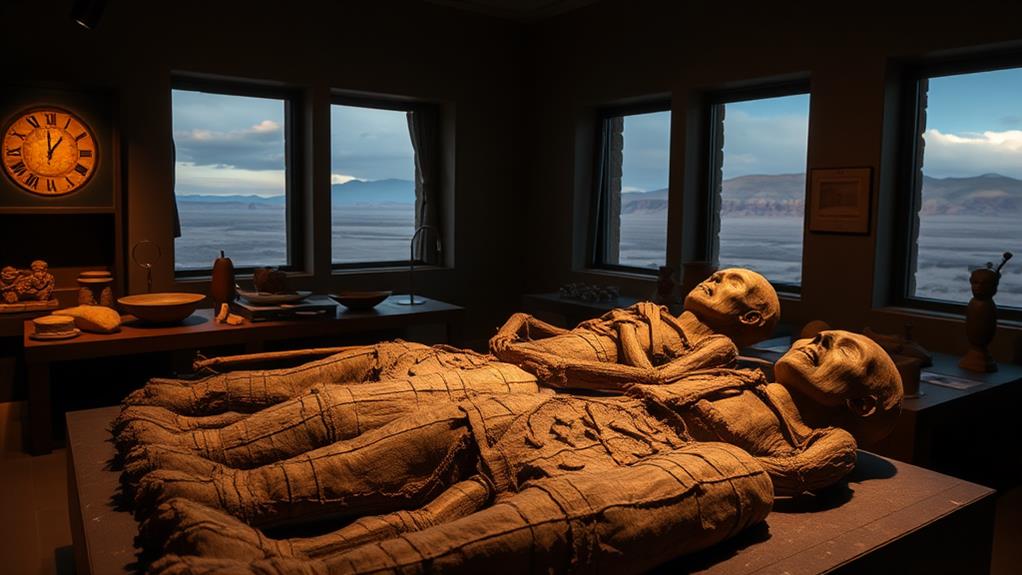
When you think of ancient mummies, Egypt might come to mind. However, you'll be surprised to learn that the oldest mummies in the world aren't found in the Land of the Pharaohs, but in Chile's Atacama Desert. These are the Chinchorro mummies, dating back to 5050 BC, predating Egyptian mummies by about 2,000 years.
The Chinchorro mummification process was incredibly advanced for its time. It involved removing internal organs and treating bodies with natural preservatives. This intricate practice reflects the cultural practices and beliefs of ancient Andean societies regarding death and the afterlife.
There are roughly 282 documented Chinchorro mummies, each offering valuable insights into the social structures, health, and environmental adaptations of these ancient people. These archaeological discoveries continue to fascinate researchers, as they provide a window into how early civilizations thrived in one of Earth's harshest climates.
The preservation techniques used by the Chinchorro have allowed these mummies to withstand the test of time, offering modern scientists a unique opportunity to study and understand the lives of people who lived over 7,000 years ago.
Natural Wonders and Geographic Extremes
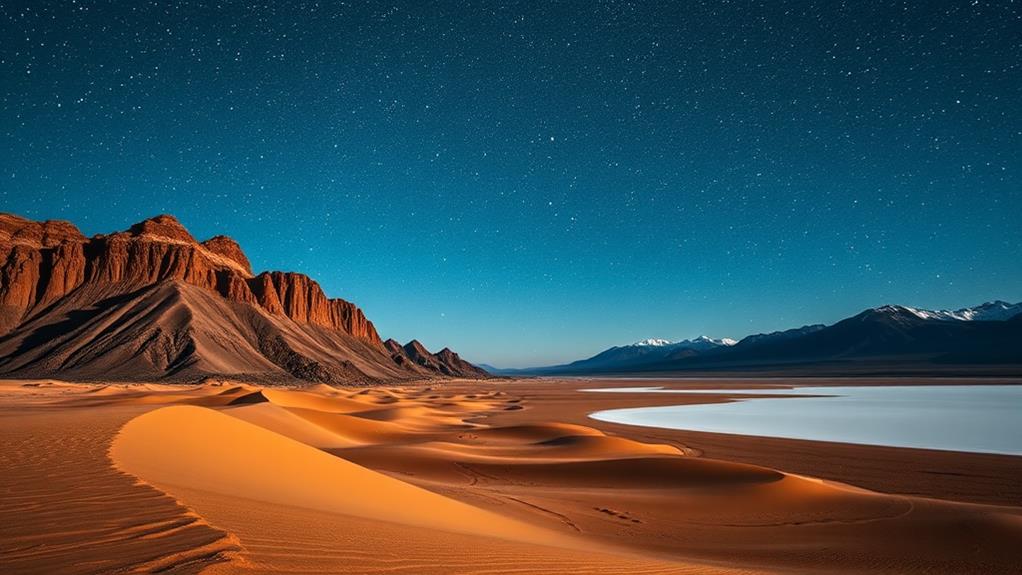
Chile's ancient mummies may captivate historians, but its natural wonders and geographic extremes will leave you awestruck. Did you know that Chile is home to the Atacama Desert, the driest desert on Earth? With an average annual rainfall of just 0.6 inches, some weather stations in the Atacama have never recorded rain. Nearby, you'll find Ojos del Salado, the world's highest volcano, towering at 6,893 meters (22,615 feet).
Chile's geography is full of surprises:
- It's the longest country in the world, stretching 4,270 km along the Pacific coast
- It boasts over 2,000 volcanoes, with about 500 considered potentially active
- Its diverse landscapes range from arid deserts to Patagonian glaciers
- It's a biodiversity hotspot with many endemic species
This volcanic wonderland is second only to Indonesia regarding volcanic activity. The country's unique geography contributes to its remarkable biodiversity, especially in regions like Patagonia and the Juan Fernández Islands. From the barren Atacama to the lush forests of the south, Chile's natural extremes offer a feast for the senses and a paradise for nature enthusiasts.
Literary Inspiration and Cultural Impact
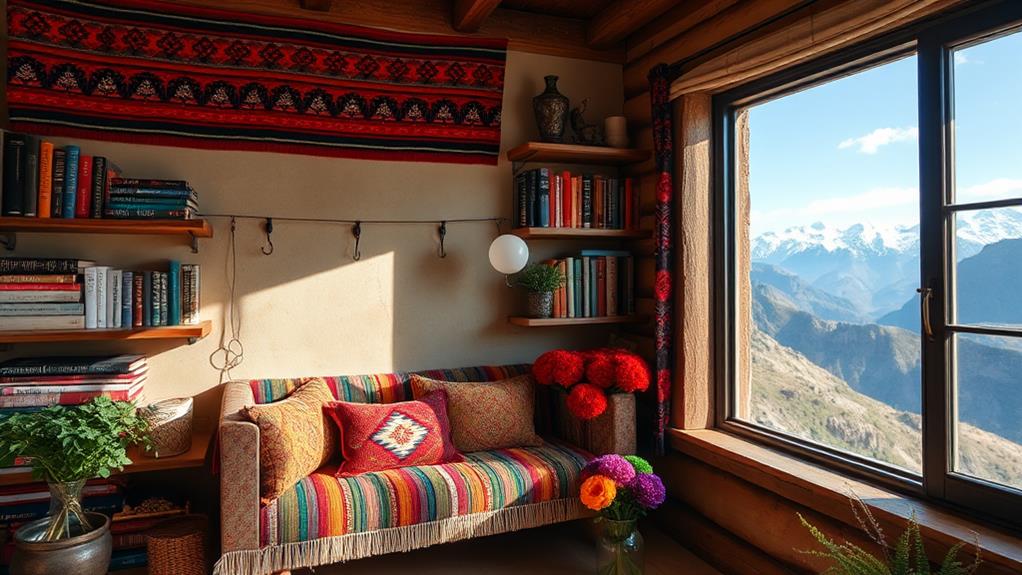
The written word has found fertile ground in Chile's diverse landscapes and rich history. You'll discover that Chile is often called the "country of poets," with good reason. Nobel Prize-winning poets Pablo Neruda and Gabriela Mistral hail from this literary powerhouse, their works shaping the nation's cultural identity.
Chile's influence on literature extends far beyond its borders. Shakespeare's Caliban from "The Tempest" was inspired by early accounts of Chile's indigenous peoples. Herman Melville's "Moby Dick" drew inspiration from a real-life whale encounter off Chile's coast, showcasing the country's maritime legacy. Even Daniel Defoe's "Robinson Crusoe" has Chilean roots, based on a Scottish sailor marooned on the Juan Fernández Islands.
Chile's literary heritage isn't limited to famous works. The country's rich folklore and oral traditions preserve narratives from various indigenous communities, offering insights into their lives and beliefs. These stories, passed down through generations, contribute to Chile's diverse literary tapestry. As you explore Chile's cultural impact, you'll find a nation that's not only geographically diverse but also a wellspring of literary inspiration.
Unique Traditions and Social Practices
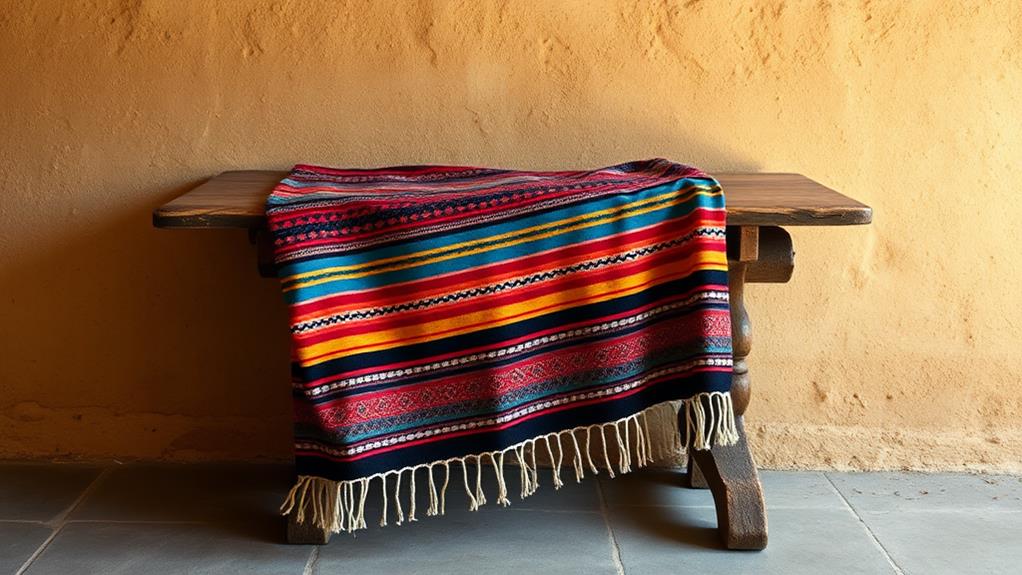
Moving beyond the written word, Chile's cultural richness manifests in its unique traditions and social practices. You'll find a tapestry of customs that showcase the country's community cooperation and cultural hospitality. In rural areas, the minga tradition exemplifies this spirit, with neighbors coming together to help relocate houses or complete other significant tasks. This strong sense of community bonds extends to social gatherings like "pichanga," where friends share informal meals of local cuisine, often including bread, cheese, and wine.
Chile's national pride shines through in various celebrations:
- Fiestas Patrias, featuring traditional music, dance, and regional customs
- La Tirana festival, blending Indigenous elements with Spanish and contemporary influences
- Typical greetings involving a cheek kiss, reflecting warmth towards locals and visitors
- The unique minga tradition, emphasizing community support in rural areas
These social practices not only highlight Chile's diverse cultural heritage but also demonstrate the importance of interpersonal connections in Chilean society. From the northern regions to the rural south, you'll encounter a rich array of traditions that have shaped the country's identity and continue to foster strong community ties.
What Makes Costa Rica’s Facts Different or Similar to Chile’s?
Costa Rica and Chile, while geographically distant, share vibrant natural landscapes yet differ in size and ecosystems. The Andes dominate Chile, while Costa Rica boasts lush rainforests. Among the interesting facts about costa rica to explore are its remarkable biodiversity and lack of a military, contrasting with Chile’s rich cultural traditions and historical landmarks.
World Records and Notable Achievements
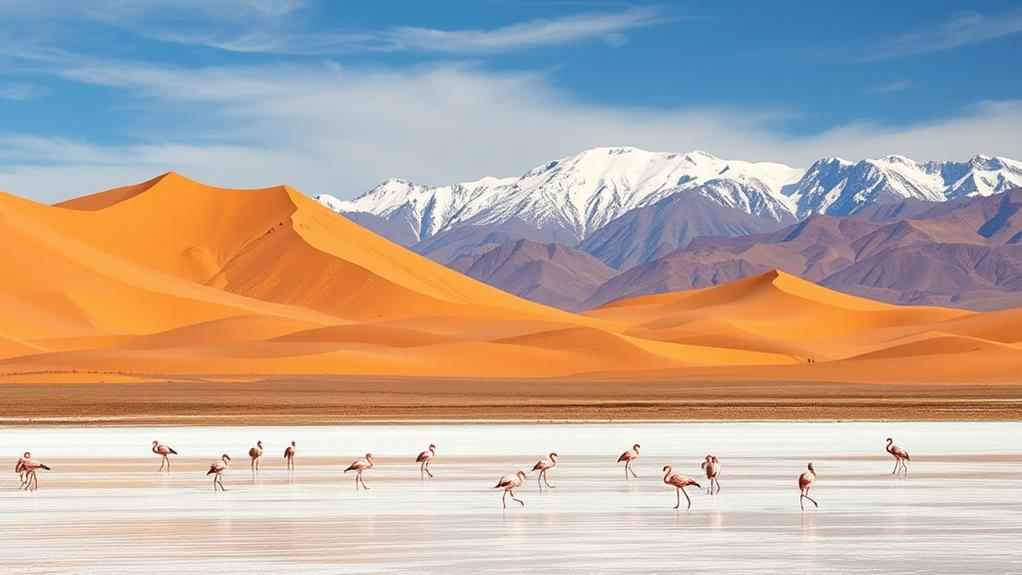
From towering skyscrapers to record-breaking pools, Chile boasts an impressive array of world records and notable achievements. You'll find the world's largest swimming pool at San Alfonso del Mar Resort, stretching the length of 20 Olympic-sized pools and holding a staggering 66 million gallons of seawater. This Guinness World Record holder is just one of Chile's many claims to fame.
| Achievement | Description |
|---|---|
| Largest Swimming Pool | San Alfonso del Mar Resort |
| Largest Fireworks Show | Valparaiso, New Year's Eve 2007 |
| Wine Exporter Ranking | 4th largest globally |
| Tallest Building | Gran Torre, Santiago (64 stories) |
| Strongest Earthquake | Valdivia, 1960 (9.5 Richter scale) |
Chile's contributions to the global stage don't stop there. The coastal city of Valparaiso set a Guinness World Record in 2007 for the largest fireworks show in South America. Meanwhile, Chile's wine industry has propelled the country to become the 4th largest wine exporter worldwide. In Santiago, you'll find the Gran Torre, South America's tallest building, standing at an impressive 64 stories. However, not all records are cause for celebration. The Valdivia earthquake of 1960 remains the largest earthquake ever recorded, measuring 9.5 on the Richter scale.
Frequently Asked Questions
What Is an Unusual Fact About Chile?
You might be surprised to learn that Chile has an officially recognized UFO research bureau operated by its Air Force. This government-funded initiative investigates unidentified aerial phenomena, making Chile one of the few countries with such a program. It's an unusual approach to a topic often dismissed by other governments. This fact highlights Chile's unique stance on unexplained aerial sightings and its commitment to exploring phenomena that many nations prefer to ignore or downplay.
What Is Unique to Chile?
You'll find several unique aspects in Chile that set it apart. The country boasts the world's oldest mummies, predating Egyptian ones by 2,000 years. It's home to the Atacama Desert, Earth's driest desert, where some weather stations have never recorded rainfall. Chile also has an official government department for UFO research. You'll discover an incredible diversity of potatoes, with 286 unique varieties on the Chiloe Islands. Ultimately, Chile holds the record for the world's largest swimming pool.
What Are 5 Historical Facts About Chile?
You'll find Chile's history both ancient and recent, fascinating and complex. Did you know Chile declared independence in 1810, but it wasn't recognized until 1818? Or that Bernardo O'Higgins, Chile's first leader, served until 1823? The 1960 Valdivia earthquake, measuring 9.5, was the strongest ever recorded. Chile's Chinchorro mummies, dating to 5050 BC, predate Egypt's by 2,000 years. Finally, Pinochet's 1973 coup led to a dictatorship lasting until the 1990s, profoundly impacting the nation.
What Is the Nickname of Chile?
Chile's nickname is "país de los poetas," which means "country of poets." You'll find this moniker reflects Chile's rich literary heritage, particularly its Nobel Prize-winning poets like Pablo Neruda and Gabriela Mistral. It's a source of national pride, symbolizing the country's cultural blend and deep appreciation for the arts. Curiously, Chile's also known as "the longest country in the world" due to its unique shape. These nicknames capture both Chile's cultural and geographical uniqueness.





